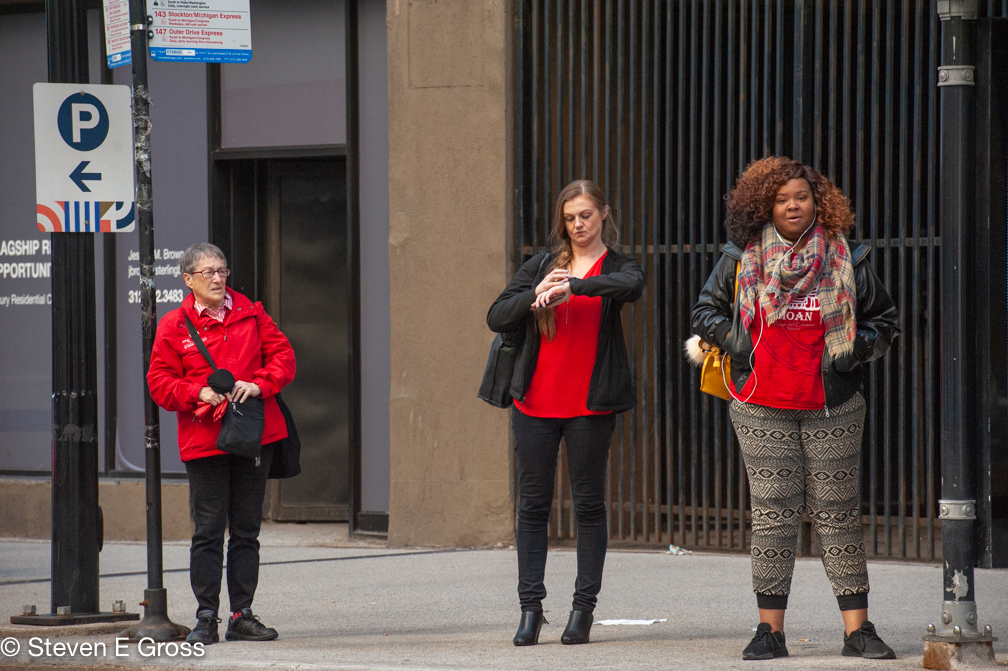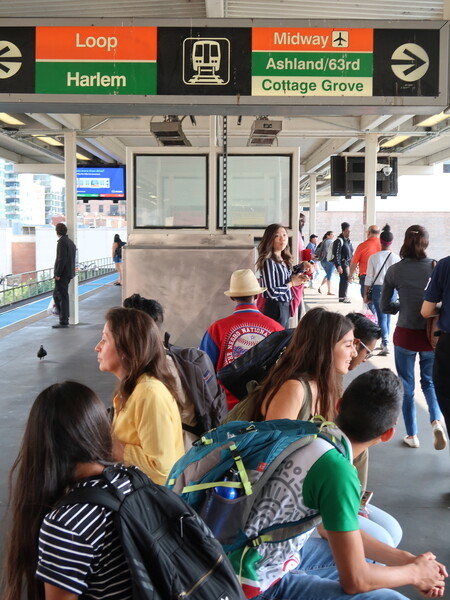We’ve long championed robust public transit as the backbone of urban sustainability and accessibility.
Unfortunately, recent trends in service by the Chicago Transit Authority (CTA) present a worrying picture, not just for transit advocates but for every resident relying on public transportation.
A concerning chart below from the Chicago Metropolitan Agency for Planning (CMAP) illustrates a stark reality: Overall transit service levels have been on the decline even before the COVID-19 pandemic hit.
CMAP data shows a staggering 29 percent reduction in CTA bus service since 2007.
The local advocacy group Commuters Take Action found that CTA has reduced rail service 24 percent and bus service 13 percent since the onset of the COVID-19 pandemic.
This decline is more pronounced when compared to transit agencies in other major cities, which have managed to bounce back to pre-pandemic service levels.

The need for action is clear. Other local transit providers like Metra and Pace have increased their services this year, yet the CTA leadership has not outlined a plan for returning to 2019 service in 2024 or even 2025.
The CTA board will be hosting a budget hearing on Thursday, November 9. If you feel strongly about improving CTA service, please consider making a comment at the hearing.
Anyone can sign up to make public comments at the hearing, and the board will be accepting written comments submitted by November 14.
See below for more information about providing comments to the CTA Board. We have talking points available for people who would like to use them.
THE TRAINING BOTTLENECK
The lack of a strong operator training pipeline is a critical bottleneck, limiting the CTA’s ability to deliver the service necessary to win back riders.
Currently, the CTA can only train a maximum of 120 rail operators per year, which is insufficient to cover the loss of operators due to attrition.
As of August, a mere 40 rail operators have been trained this year as of August, highlighting a stark gap in capacity.
To reverse this trend, we urge the CTA to scale up its training capacity to train 300 rail operators annually and renew the attractive sign-on bonus for bus operators.
These two steps would swiftly increase service levels.
The agency’s lack of urgency around this crisis reflects poorly on our city, as well as the state’s leadership, who are working to position Chicago and Illinois as a leader in sustainable transportation and equity.

A FUNDING CRISIS
Moreover, the CTA must use its funding to maximize service. A vicious cycle is, unfortunately, already in motion: Reduced fare revenue has led to a smaller operations budget, resulting in transit service cuts.
This not only hampers efforts to regain ridership but also puts the CTA on the verge of a financial crisis.
To win back riders and steer the CTA away from a fiscal cliff, we need a bold vision and substantial investment.
The State of Illinois, in particular, has an important role to play in stabilizing our transit system.
Early next year, the Illinois General Assembly is poised to address the fiscal cliff facing our region’s transit agencies.
It’s crucial for the CTA to demonstrate its commitment to improving service levels, which will be fundamental in seeking new revenue to avert financial disaster.
INFRASTRUCTURE AND HOUSING
Prioritizing equitable Transit-Oriented Development (eTOD) is another critical step.
The CTA must collaborate with the Chicago Department of Housing and CDOT to build affordable housing and dedicated bus lanes.
Many CTA stations remain non-ADA compliant, with repairs indefinitely postponed. The forthcoming budget must address these issues with clear timelines for repair.
THE CTA OPERATING ENVIRONMENT
Finally, we cannot overlook the importance of public engagement and the “Treatment not Trauma” initiative.
A transit ambassador program, aligned with the priorities of the current mayoral administration, would be a positive move toward enhancing the environment at train stations and on board buses and trains.
It’s time for the CTA leadership to address these challenges head-on. The vitality of our city depends on a reliable and accessible transit system.
We stand ready to support the CTA in making the necessary changes to protect and enhance the quality of our public transportation.
PROVIDING VERBAL COMMENTS AT NOVEMBER 9 HEARING
Members of the public who wish to speak at the public hearing are encouraged to register prior to the hearing. Register by completing and submitting a Request to Speak form online at transitchicago.com/finance by 6 p.m. Tuesday, November 7.
We have talking points available for people who would like to use them.
People registered to provide an in-person oral statement at the public hearing will be announced to deliver their remarks during the public hearing.
People wishing to deliver their remarks via dial-in must indicate the dial-in option on the Request to Speak form. Registered speakers who have opted to dial-in will be called by CTA, at the telephone number provided on their Request to Speak form, during the Thursday, November 9 hearing to be connected to the public hearing proceedings.
Members of the public may also make in-person requests while the hearing is in process. Requests will be accepted between 6 p.m. – 7 p.m. on Thursday, November 9, 2023.
Individuals who pre-register to speak will be heard first. Individuals who request to speak while the hearing is in progress will then speak in the order their request was received.
At the public hearing, an American Sign Language interpreter and a Spanish interpreter will be provided. Individuals with disabilities who require other accommodations to review the budget or provide feedback should contact the Office of the Board Secretary at Boardoffice@transitchicago.com or by calling 312-681-5022 or contact Relay.
SUBMIT WRITTEN COMMENTS BY NOVEMBER 14
Please use our action alert tool to make your voice heard! The deadline to submit written comments is November 14 at 5 p.m. so please share the action alert link with your networks to amplify the message!
We have talking points available for people who would like to use them.
You can also submit your own written comments in the following manner:
- By correspondence addressed to Chicago Transit Authority, Office of the Board Secretary, 567 W. Lake Street, Chicago, Illinois 60661.
- By hand delivery to the above address turned in to the first floor mail room
- By fax to 312-681-5035.
- By email to Boardoffice@transitchicago.com.


